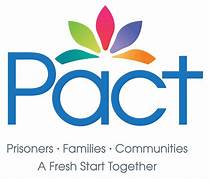New justice ministers need to get a grip on growing crisis in prisons and probations, says Pact CEO Andy Keen-Downs
Amidst the political and economic turmoil of recent months, and the challenges facing so many of our overstretched public services, the plight of prisons and the probation service is unlikely to be at the forefront of many people’s minds. But for Pact, the Catholic rehabilitation charity, the sense of crisis in our prison system and probation service – and in our courts and mental health services – is a real and present danger, says the charity’s CEO, Andy Keen-Downs:
I have a file on my computer with letters that I have written to Secretaries of State for Justice going back to the time of David Blunkett. There are a lot of letters. Justice Ministers, and the Prison and Probation Ministers that sit under them, pass us by with growing speed on a kind of Ministerial conveyor belt, none staying long enough to implement the plans of their predecessors, and many inventing new plans, and so on and on it goes. Sometimes, I wonder why I bother, but I have to be an optimist, and part of my job has to be to speak truth to power. And so, I have added new letters to the file, to Brandon Lewis, the latest Secretary of State for Justice, and to Rob Butler, the new Prison and Probation Minister. With the greatest respect to both men, neither of whom I know personally, on the basis of the current political climate, I suspect that neither of them will have long to make any significant impact. In the hope of catching their attention, I have published an open letter setting out five key priorities.
In this letter, I point out that repeat offending by people who have been in prison costs our society around £18 billion every year; that the rates of self-harming by women and men in prison remain close to record levels; that His Majesty should be worried that the Prison Service that operates in his name is losing record numbers of staff – faster than they can be recruited – meaning that we have too few officers to run safe regimes in many prisons, and a huge brain drain of experienced staff; and that the same is true of our Probation Services, which in many areas, is struggling with its most basic task of protecting the public, let alone, of providing genuine resettlement support to homeless, jobless prison leavers. Those who are left, those who stay, include some of the most dedicated, professional and inspirational public servants you could ever hope to meet, including some truly outstanding leaders. Sadly, in prisons, it is also true to say that there are a minority of prison officers who are kept in post because Governors are desperate for staff, and whose conduct would not be tolerated in many other professional walks of life. We know all of this because Pact has around 300 brave and compassionate Pact staff and around 600 wonderful volunteers working in over 60 prisons, and in probation services, supporting prisoners, people on probation, and their children and families. We are on the frontline, shoulder to shoulder with public sector staff. And there are quite simply too few of them.
So, what goes on in prisons and probation services is complicated. Whether you are a prison officer, probation worker, chaplain or Pact worker, you are dealing with people who are in the criminal justice system because they have experienced trauma, mental ill health, violence, abuse, addiction, childhoods in care, homelessness, systemic racism and poor education. That is not to say that we believe people should not take full responsibility for their crimes. Our Catholic ethos is clear that we are all capable of sin, and need to find the space in our hearts for repentance. But we also see the messy realities of people’s lives that have led them into the criminal justice system, and we know that we are all at God’s mercy. We hold fast to the belief that no one, no matter what, is beyond redemption and the possibility of a fresh start.
We are a charity of service rather than a policy organisation, and it is unusual for us to go public with a call on Ministers to get a grip. So, that should give readers a sense of how bad things are. It is not just me saying it. When prisoners, months after the end of COVID prison lockdown, are still reported by the Chief Inspector of Prisons to be stuck in their cells for up to 23 hours a day in some prisons, with no access to education, it tells us that our prison system is itself in dire need of rehabilitation.
To keep things simple, I have offered our new Justice Ministers five suggestions as to what they could do to create safer prisons, drive down reoffending, and reduce the burden on the taxpayer during this economic crisis. We have asked the Minister to:
- Halt the prison expansion programme and save billions of pounds in public money
Minister, we ask you to reconsider plans to expand the prison estate. The Government, for the first time in history, has set about a massive increase in the prison population – from 80,000 to 100,000, in just 5 years, committing to spend billions on massive new prisons. No Government, Conservative or otherwise, has ever planned to spend such a large amount of public money on such a scheme. Instead, we propose spending a fraction of that sum on more support to reduce reoffending, which now accounts for four out of every five crimes that are committed.
- Deliver on Lord Farmer’s recommendations to invest in family support
Minister, please ensure that all the recommendations of the Lord Farmer reviews are actioned, and put healthy family relationships at the heart of prison regimes. As you know, Lord Farmer is a Conversative member of the House of Lords, whose reports into what works were hailed by your own Government as ‘groundbreaking’. Keeping prisoners in contact with family and friends reduces the risk of self-harm and violence and builds safer communities. Prisoners who receive visits from a family member are around 40% less likely to reoffend. Some good work has been done, which we support, but you have only scratched the surface. Families matter!
- Stop locking up mentally ill people in prisons, and invest in quality mental health services
Far too many people die in British prisons because they are mentally ill. Locking up people who have offended because of schizophrenia or psychosis is immoral, cruel, and overwhelms our prison staff. Make better use of community sentences and diversion into treatment. Too many people who offend because they are experiencing mental ill health and/or addiction languish in cells where they will get worse, not better. Community sentences with treatment requirements are significantly more effective at reducing reoffending than a short stay in prison. Let’s make people better, not worse.
- Deliver on your own Government’s ‘Female Offender Strategy’ rather than locking up more women in prison
It is time for a coherent delivery plan for the women’s estate, based on your own Government’s policy. The recent pledge to build 500 new places for women needs to be overturned. It contradicts the aim of your own Department’s ‘Female Offender Strategy’ to ‘reduce female prison places’. We need a coherent approach that imprisons fewer women who pose low or no risk to the public. We need to stop imprisoning pregnant women. We need to care for the children of prisoners who are the ‘collateral damage’ of a cruel system.
- Get a grip on the workforce crisis, which puts prisoners, staff, and the public at risk
We need, more than anything else right now, a credible plan to recruit and retain prison officers. Over one in seven officers left the service last year – this is a crisis. Governors cannot run safe, secure, decent establishments, which have any hope of reforming people, without confident, professional, experienced staff. We urgently need your department to get a grip and HM Treasury to overturn a decade of brutal spending cuts.
That is our five point message to the Government. We are not a campaign group. Our work is about being ‘in the mess’, serving people who our Lord Jesus called ‘the least of these’ (Matthew 25). Our work is possible because of the generosity and solidarity of the Catholic community. This Prisoners’ Sunday, 9thOctober, we invite individuals and parishes to support our work, and to connect with us, to explore what we as a community can do to make a difference. We have set up a special email account and look forward to working together as a community, to offer the hope of rehabilitation and a fresh start to prisoners and their families. Contact us at parish.action@prisonadvice.org.uk

Andy Keen-Downs is Chief Executive
of the Prison Advice & Care Trust (Pact)


